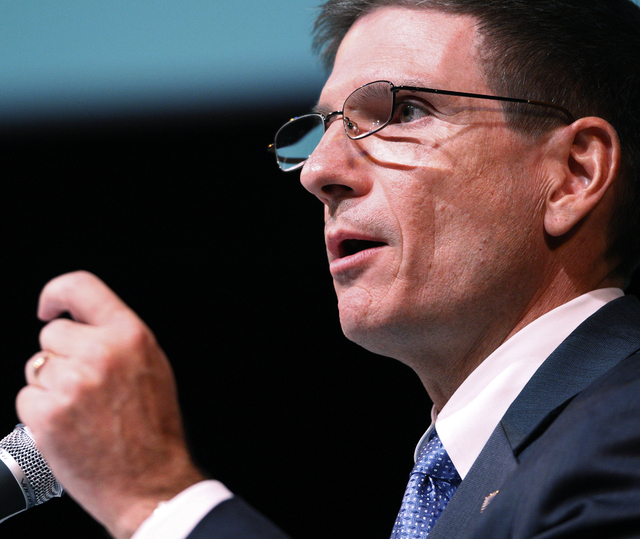Washington Digest: House continues to allow lawmakers to lease autos

WASHINGTON — The House voted last week to continue allowing lawmakers to lease personal cars with taxpayer money.
Lawmakers voted 221-196 to kill an amendment that would have prohibited leases for autos but would have allowed short-terms rentals and the use of minibuses as mobile district offices.
“I am just not convinced that this is a necessary use of taxpayer money, and neither are the constituents that I represent,” said Rep. Richard Nugent, R-Fla., who proposed the ban.
“Members of Congress driving around the Capitol in luxury vehicles financed by the taxpayers that they represent isn’t exactly the image we want to portray to the American people, especially when many Americans are struggling just to get by,” said Nugent, who noted the Senate already prohibits leased vehicles for personal use.
Sixty-three lawmakers lease cars, paying an average $589 monthly, said Rep. Tom Cole, R-Okla., chairman of the subcommittee that sets annual spending for the House of Representatives. The money comes out of the office allowances granted each House member.
Saying he does not lease and was not defending the practice, Cole explained some lawmakers represent large districts and areas with rough terrain that require vehicles “a bit more robust” than they might normally drive. In other cases, he added, it might be more economical to lease than to pay mileage reimbursements.
Rep. Debbie Wasserman-Schultz of Florida, the subcommittee’s top Democrat, said Nugent should not “dictate to other members how to spend their office budget.” She said she does not lease.
Reps. Mark Amodei and Joe Heck, both R-Nev., voted to ban auto leasing. Reps. Steven Horsford and Dina Titus, both D-Nev., voted against the ban. Amodei, Heck, Horsford and Titus do not lease vehicles, according to their offices.
House members debated several line items in the $3.3 billion fiscal 2015 spending bill for the legislative branch before passing the bill with minor opposition.
Rep. Paul Gosar, R-Ariz., proposed to save $3.1 million through a cut to the U.S. Botanic Garden on Capitol Hill. The cut would bring its budget down to the current year level.
Gosar complained about $5.1 million in the garden budget for improvements and repairs.
“Rather than making minor repairs to a few small leaks in the roof, the Architect of the Capitol is proposing to tear down the entire roof and replace it with something called a new vegetative roofing system,” Gosar said. “We shouldn’t be wasting precious taxpayer money on a new, state-of-the-art vegetative roofing system.”
Defending the budget, Cole said the bill already reduced the architect’s request. The Botanic Garden, he added, “is a pretty old building, and we really do have serious problems here that we think are potentially health hazards.
Wasserman-Schultz accused Gosar of “trying to generate headlines by attempting to cut much-needed funding to one of the most beloved destinations in Washington, D.C.”
Gosar’s amendment was approved, 219-198. Heck voted for it. Amodei, Titus and Horsford voted against it.
VA DOCTORS CAN’T TALK POT
The House voted to uphold a directive that VA doctors not discuss use of medical marijuana for ailing veterans even in states where its use is legal.
Lawmakers voted 195-222 to kill an amendment by Rep. Earl Blumenauer, D-Ore., who represents one of 21 states where marijuana has been legalized for medicinal purposes.
Veterans are benefiting from marijuana treatment, “yet the Veterans Administration specifically prohibits its medical providers from completing forms brought by their patients seeking recommendations or opinions” regarding treatment, Blumenauer said.
“Our VA physicians should not be denied the ability to offer recommendations and advice that they think meets the needs of their patients,” he said. “This shouldn’t be controversial.”
Rep. Sam Farr, D-Calif., said VA doctors would not be allowed to write prescriptions for marijuana but would be allowed to give advice on the treatment.
Rep. John Culberson, R-Texas, spoke against the amendment, saying “Marijuana is prohibited under federal law. Any federal facility funded with federal dollars — I think it is entirely appropriate that it continue to be prohibited on a federal facility.”
Veterans “can certainly go to a private physician,” he said.
Heck, Titus and Horsford voted for the Blumenauer amendment. Amodei voted against it.
MINIMUM WAGE BILL SHELVED
The Senate failed to overcome a Republican-led filibuster and shelved a bill that would have increased the federal minimum wage to $10.10 an hour. A procedural test vote was 54-42, where 60 votes were needed to advance.
Sen. Dean Heller, R-Nev., voted not to advance the bill. Sen. Harry Reid, D-Nev., favored the bill but voted against it for procedural reasons that allow him to bring it back to the Senate floor.
Democrats said increasing the minimum wage was popular among a majority of Americans and necessary to lift low-level workers to where they can support their families. They said it would lift 900,000 people out of poverty
Republicans pointed to a Congressional Budget Office report that concluded a wage hike could result in the loss of 500,000 jobs as employers reconfigure their payrolls.
Democrats said they planned to revisit the issue as some moderate Republicans were searching for compromises.
Contact Stephens Washington Bureau Chief Steve Tetreault at STetreault@stephensmedia.com or 202-783-1760. Find him on Twitter @STetreaultDC.












